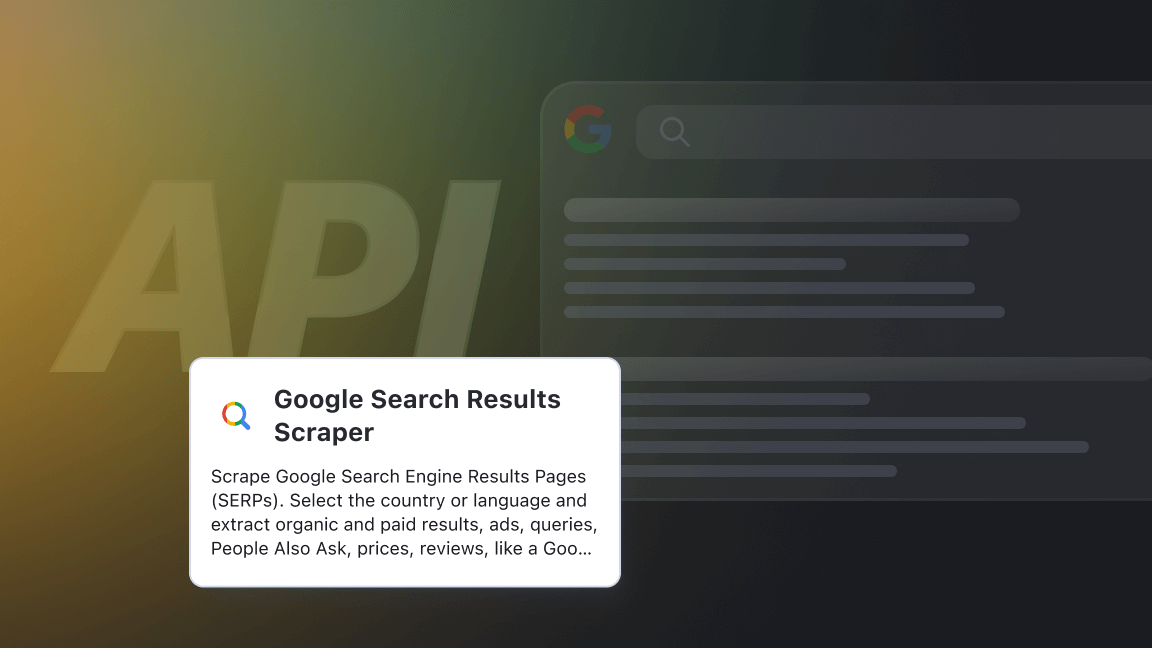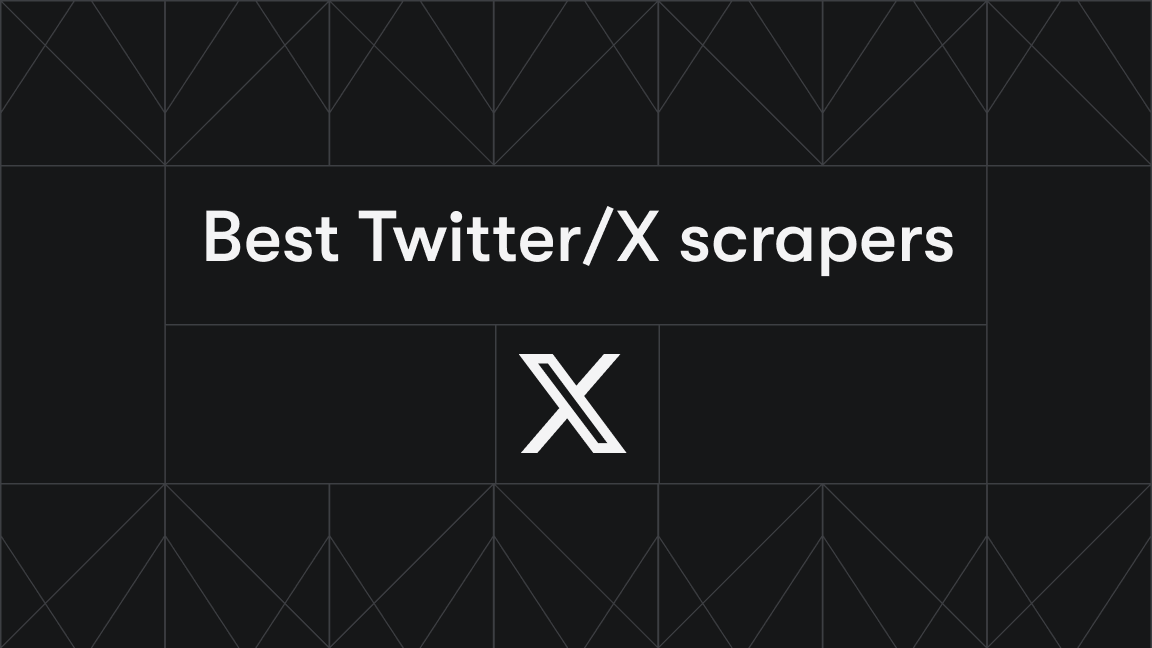Search engine optimization is a craft and we've all got our favorite SEO tools. Ahrefs, Semrush, Screaming Frog and the rest might be the essentials, but are they the only tools you should have in your tool kit? Web scraping is rapidly becoming a versatile, flexible way to monitor the performance of your own website, keep an eye on your competitors, perform customized SEO audits, and even extract data from Google that just isn't available in any other way.
Apify has a range of SEO tools that can help you take advantage of the potential for web scraping to take your search engine optimization to a whole new level.
All of these tools will scrape data and deliver it to you in structured formats such as Excel, CSV, JSON, or XML that are easy for you to plug into other tools, spreadsheets, reports, or applications. And the data is entirely yours to use as you like. You can also run these scrapers as often as you like, with no restrictions or limitations. To use Apify Actors, just sign up for a free account, no credit card required.
Is it legal to scrape search engines?
Visiting websites that are accessible to the general public is very much legal, so why should a robot doing this be frowned upon? Scraping is therefore permitted as long you comply with regulations such as GDPR or CCPA and respect copyrighted content. Read on about the laws connected to scraping at our legality blog post.
Let's look at five of our top SEO tools and see what they can do for your business website.
Can I use AI to scrape search engines?
AI is currently unable to scrape websites directly, but it can help generate code for scraping search engines if you prompt it with the target elements you want to scrape. Note that the code may not be functional, and website structure and design changes may impact the targeted elements and attributes.
Google Search Results Scraper
With more than 3.5 billion searches made on Google every day, search engine results pages (SERPs) are the front line of SEO. If Google isn't ranking you high enough in its results pages, you need to find out what you're doing wrong - or what your competitors are doing right. You can learn a lot by manually searching for your industry or brand, but you'll need some real data to make better SEO decisions.
Google Search doesn't provide an API to let you extract data at scale and Google Ads or Google Analytics can only give you part of the picture. Web scraping can fill in the gaps and let you extract the data that's behind your position in the rankings.
Our unofficial Google SERP API will give you access to all of this data about any business that appears in search results:
- Organic search results
- Advertising
- Related queries
- "People Also Ask" boxes
- Prices
- Reviews
Because our SERP scraper is customizable, you can query phrases, URLs, choose any country or language, or even focus on an exact geolocation so that you even know what people in a specific neighborhood are seeing when they search for topics related to your business.
Here are just some ways to use that data to boost your SEO rankings:
- You can regularly monitor your website ranking and the ranking of your competitors. If you scrape SERP data every day, or even every hour, you can spot ranking changes before they become threats.
- Google Search is packed with SERP features that offer opportunities for SEO. Scraping SERPs can tell you which Featured Snippets, Knowledge Panels, video carousels, or image packs appear for the keywords or phrases relevant to your business. You can then optimize your website and content to target these SERP features. Many agencies rely on an SEO reseller to handle this optimization at scale for multiple clients. We don't have to tell you the effect it will have on your traffic if Google uses your content as a Featured Snippet!
A vital professional insight is that optimizing for these SERP features requires more than just content changes. According to Perth SEO Studio, technical SEO, such as ensuring fast page loading times and structured data implementation, plays a key role in securing these coveted spots. - If you think a competitor is bidding on your brand or on the queries most important to your traffic, you can monitor paid ad results and decide whether you need to start bidding to protect your position.
- "People Also Ask" boxes are packed with inspiration for new ideas. Regularly scrape them and craft your website and content to target what users are interested in.
Apify's Google Search Results Scraper is free to use and easy to configure. Check out this tutorial to get started.
SEO Audit Tool
SEO audits are a fact of life for every marketing manager or SEO consultant. There are often hidden technical issues that stop websites from ranking on Google or other search engines. An SEO audit is designed to identify these issues and find out what needs to change. It's a process that helps you clean up after updates or deployments, spot opportunities for improvement, and generally tune up your website so that it performs well in search.
Popular SEO tools, including Google Analytics and Google Search Console, can be used to identify many of these kinds of issues, so why use web scraping for your SEO audit? One of the main reasons is that the data you scrape comes in structured, predictable formats that can easily be used in other applications or tools. But it's also about complete freedom to customize, so you can decide exactly what you need to find out and regularly extract that data.
Apify's SEO Audit Tool lets you scrape for dozens of issues that could affect your ranking, including broken links, word counts, no-follow links, meta descriptions, broken images, and much more. You can schedule the scraper to run as often as you like, so you get regular data on how your website is seen by search engines. You can of course also run the SEO Audit Tool on any website, even those of your competitors.
Regular SEO audits can help you:
- Make sure that your website is working properly from day to day and get alerts as soon as something goes wrong.
- Generate automated reports with ideas for how to improve your website.
- Receive immediate notifications about broken links or images.
- Check on meta data to make sure the Googlebot sees what you want it to see.
- Analyze the weak spots of competitor web pages and identify opportunities to benefit from those weaknesses.
Apify's SEO Audit Tool is easy and free to use. Just set the URL you want to audit and do whatever you like with the data.
Google Trends Scraper
Driven by Google's mission to "organize the world’s information and make it universally accessible and useful", Google Trends is a window onto the world of search. It tells you how often search terms are entered into Google Search and tracks relative popularity over time.
Google Trends can tell you what's popular and what's likely to be popular in the future. If you analyze Google Trends at scale, you can gain powers of prediction that can directly translate into an SEO edge.
There's no Google Trends API, but once again you can rely on Apify's Google Trends Scraper to extract data. By scraping "interest over time" data, you can gain insights into how to position your brand and website to take advantage of changes in what people are searching for.
- Enrich your keyword research and plan content marketing based on seasonal interest, upcoming trends, or regular events.
- If you spot that searches for your brand are growing but your direct or organic traffic isn't increasing, you can investigate the reasons behind the mismatch and how to correct it.
- By targeting different countries around the world, you can identify trending topics and optimize your content plan based on local variations in interest. Fashions and viral spikes move fast, but not all topics trend at the same time all over the globe.
Check out our quick start tutorial on how to scrape Google Trends and get started with Google Trends Scraper.
Contact Details Scraper
SEO isn't just about automated checking of websites and identifying what people are searching for on Google. It's also about link building, Digital PR scoring backlinks across the web, and building relationships with other websites in your niche or industry. This means that you'll need to get in touch with other webmasters, content creators, and marketers.
One effective strategy for enhancing your link building efforts is through guest posts, which allow you to create valuable content for other sites while earning backlinks in return. However there are many types of backlinks, it's essential to understand Google's perspective on guest posting. When done correctly, guest posting can boost your link profile and establish meaningful connections within your industry. It can also help you build editorial links from reputable sources, which carry more authority and long-term SEO value.
While first contact will probably need to be a highly personalized and carefully crafted email, you can reduce your workload by automating some of the process. Identifying the right people and finding out more about them doesn't need to be done manually if you rely on a scraping tool like Apify's Contact Details Scraper.
Give the scraper a starting URL and it will crawl through the site to extract all of the following contact information:
- Email addresses
- Phone numbers
- LinkedIn profiles
- Twitter handles
- Instagram profiles
- Facebook user profiles or Facebook Pages
This will save you valuable time and ensure that you don't miss out on good leads. Armed with this data, you can decide who you need to contact and find out a little bit more about them before you send out that all-important first email. After collecting the data from Contact Details Scraper, all you need is Google Sheets, Excel or even Word to automate the entire process - learn how to mail merge step by step in this guide.
Apify's Contact Details Scraper is easy to use, but you can read our quick tutorial if you want some tips.
Remember that you need to be careful when scraping personal data at scale.
Content Checker
Part of good SEO is being aware of changes and developments on your own website and those of your competitors. In even a small company, developers or just interns can make "improvements" that can dramatically harm SEO. And sometimes those changes aren't spotted until Google has been happily indexing them and reducing your ranking.
If something is important to your business, it makes sense to keep track of any changes made. Apify's Content Checker is a simple, but versatile tool for this. It allows you to select any elements on a web page and check them regularly to detect changes. If Content Checker finds that the content has changed, it will take a screenshot and send you an email notification so that you can react quickly and fix problems before they do too much damage.
Of course, you can also use Content Checker on other websites. If you're locked in close competition with another vendor or service provider, you can keep track of pricing changes, new solutions, content marketing, or any other changes they might make. Rather than just finding out about these when you run through your regular checks on competitors, you can be informed of them in almost real time and do what's needed to prevent their SEO from harming yours.
Content Checker is really easy to use. Read our short article on how you can set it up for any website in just five minutes.
If you want to use web scraping to improve your SEO but you don't want to do it yourself, or you need something special, you can always request a custom solution from us. Our world-class scraping experts will use an agile approach to deliver a reliable and scalable solution that can extract and process as much data as you need.












